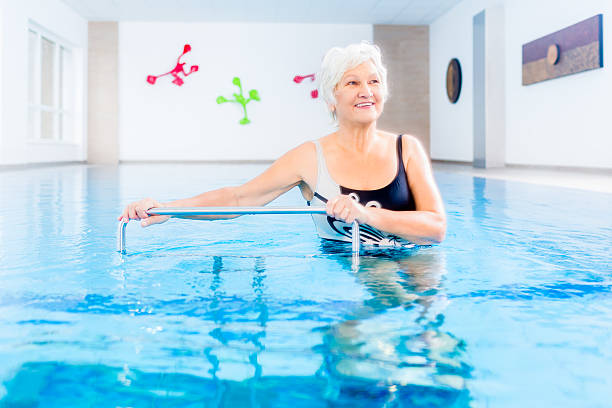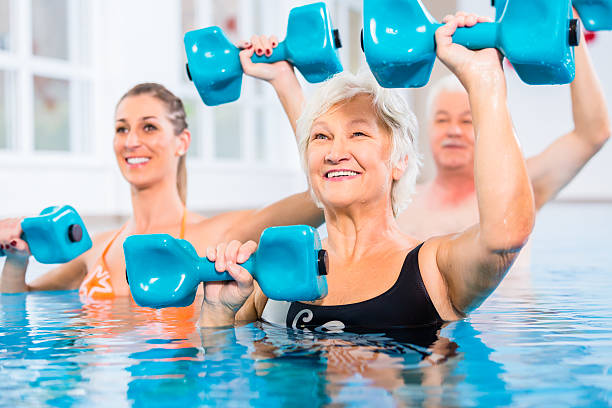Aquatic therapy, also known as water therapy or hydrotherapy, has gained popularity as an effective rehabilitation method for seniors. This form of therapy utilizes the unique properties of water to provide a low-impact, high-resistance environment that can aid in improving physical function and overall wellness. The buoyancy of water reduces the strain on joints and muscles, making it an ideal option for older adults who may struggle with traditional forms of exercise.
Whether recovering from surgery, managing chronic conditions, or simply looking to maintain mobility, aquatic therapy offers a gentle yet powerful way for seniors to regain strength, flexibility, and confidence in their physical abilities.
Benefits of Aquatic Therapy
Aquatic therapy is much more than just a workout in water; it’s a comprehensive approach to rehabilitation that leverages the healing properties of aquatic environments. For many seniors, transitioning from land-based activities to water-based exercises can open new doors for maintaining health and vitality. Below, we’ll explore some of the key benefits that make aquatic therapy a preferred choice for many older adults.
Reduced Joint Pain
One of the primary benefits of aquatic therapy is the significant reduction in joint pain. The buoyancy provided by water helps to minimize the weight and stress on joints. This is especially beneficial for seniors with arthritis or other joint-related conditions, as it allows them to move more freely and comfortably during exercise.
Improved Muscle Strength
Aquatic therapy leverages water resistance to enhance muscle strength. Unlike traditional exercise, which relies on weights or bands, the resistance in water is more evenly distributed and less likely to cause injury. This makes it an excellent option for seniors looking to build or maintain muscle mass without putting undue strain on their bodies.
Enhanced Flexibility
Flexibility often decreases with age, but aquatic therapy can help counteract this natural decline. The warm water used in most therapy pools helps to relax muscles, making it easier for seniors to perform stretching exercises. Over time, these activities can improve the range of motion and overall flexibility.
Cardiovascular Health
Engaging in aquatic activities can also provide substantial cardiovascular benefits. Water-based exercises such as swimming or water aerobics help to elevate the heart rate, boosting cardiovascular fitness. This is crucial for seniors, as maintaining heart health is vital for overall wellness and longevity.
Balance and Coordination
Aquatic therapy can significantly improve balance and coordination. The supportive nature of water allows seniors to practice balance exercises without the fear of falling. This is particularly important for reducing the risk of falls and related injuries, which are common concerns for the elderly.
Mental Well-Being
Beyond physical benefits, aquatic therapy positively impacts mental well-being. Water’s soothing properties can help reduce stress and anxiety, providing a sense of calm and relaxation. Furthermore, the social aspect of participating in group water therapy sessions can enhance social connections and combat feelings of loneliness or isolation.
Customized Programs
Another advantage of aquatic therapy is the ability to customize programs to meet individual needs. Therapists can tailor exercises to address specific health conditions or rehabilitation goals, ensuring that each senior receives the most effective and appropriate care.
By incorporating aquatic therapy into their routine, seniors can experience a comprehensive approach to improving their physical and mental health, leading to a higher quality of life.
Flexibility and Range of Motion
Staying active is essential for maintaining overall health, particularly for seniors. As we age, finding suitable and enjoyable forms of exercise becomes increasingly important. Aquatic therapy offers a unique and effective way for seniors to engage in physical activity, providing numerous benefits catering to their needs.
Enhanced Mobility

Aquatic therapy significantly enhances flexibility and range of motion, which is crucial for maintaining independence in daily activities. The buoyancy of water reduces the strain on joints, allowing seniors to perform stretches and movements that might be challenging on land. This can improve joint function and decrease stiffness, which is particularly beneficial for those with arthritis or other joint-related issues.
Muscle Relaxation
The warm water typically used in aquatic therapy helps in relaxing muscles, making it easier for seniors to stretch and move freely. This relaxation effect can alleviate muscle tension and reduce pain, offering a more comfortable and effective therapy session. Muscle relaxation also promotes better blood circulation, aiding in the recovery process.
Increased Joint Flexibility
Consistent participation in aquatic therapy can lead to increased joint flexibility. Water’s resistance works against the body’s movements, gently encouraging a broader range of motion. Over time, this can result in enhanced joint flexibility, making it easier for seniors to perform daily tasks and reducing the risk of injury.
Through aquatic therapy, seniors can improve their flexibility and range of motion, enjoy greater physical freedom, and significantly enhance their overall quality of life.
Conclusion
Aquatic therapy offers numerous benefits for seniors, making it a unique and highly effective way for them to engage in physical activity. From enhanced mobility and muscle relaxation to increased joint flexibility, this type of therapy caters to the specific needs of seniors, promoting better physical health and overall well-being. With these benefits in mind, aquatic therapy is an excellent option for seniors looking to stay active and maintain their independence.
